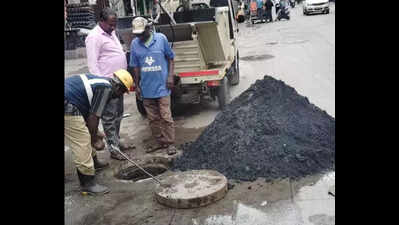
Hyderabad: Hyderabad Metropolitan Water Supply and Sewerage Board (HMWSSB) has come up with an innovative idea, convert silt being recovered from over three lakh manholes across the city into useful resources, including bricks, tiles and paver blocks.
During their ongoing 90-day special drive, HMWSSB has been carrying out manhole desilting operations and discovered that over 60% of the collected silt contains sand particles. The drainage silt composition typically includes a combination of mud and sand particles. The Greater Hyderabad area sewer networks span 3,600 km with three lakh manholes.
These lines haven’t undergone major desilting for many years. The black sand is particularly suitable for footpaths, with some companies already producing tiles from processed silt.
Following this finding, they forwarded samples to JNTU Hyderabad for scientific analysis. Based on the research findings, HMWS&SB intends to utilise the processed material for manufacturing bricks and paver blocks for city infrastructure development. In fact, during the rainy season, these manholes collect substantial amount of sand deposits, estimated to accumulate approximately 200 tonne of silt.
“The samples have been forwarded to JNTUH for analysis. They indicated a six-month time frame to evaluate the strength and stability of materials used in bricks and paver blocks, along with determining necessary parameters. The decision to transfer the material to the construction and demolition (C&D) waste facility or allocate it to an agency will be based on their assessment report,” a senior HMWS&SB official said.
Meanwhile, the water board has so far desilted 1.22 lakh manholes and cleared 1,602 km of sewer lines across 12,673 locations as part of the special drive on making Hyderabad a ‘sewerage overflow-free city’. The corporations has been operating 220 airtech machines and 146 silt removal vehicles for sewage management. As part of this, each team has been desilting up to 200 metres of pipeline and cleaning 20 to 25 manholes daily.
Hyderabad: Hyderabad Metropolitan Water Supply and Sewerage Board (HMWSSB) has come up with an innovative idea, convert silt being recovered from over three lakh manholes across the city into useful resources, including bricks, tiles and paver blocks.
During their ongoing 90-day special drive, HMWSSB has been carrying out manhole desilting operations and discovered that over 60% of the collected silt contains sand particles. The drainage silt composition typically includes a combination of mud and sand particles. The Greater Hyderabad area sewer networks span 3,600 km with three lakh manholes.
These lines haven’t undergone major desilting for many years. The black sand is particularly suitable for footpaths, with some companies already producing tiles from processed silt.
Following this finding, they forwarded samples to JNTU Hyderabad for scientific analysis. Based on the research findings, HMWS&SB intends to utilise the processed material for manufacturing bricks and paver blocks for city infrastructure development. In fact, during the rainy season, these manholes collect substantial amount of sand deposits, estimated to accumulate approximately 200 tonne of silt.
“The samples have been forwarded to JNTUH for analysis. They indicated a six-month time frame to evaluate the strength and stability of materials used in bricks and paver blocks, along with determining necessary parameters. The decision to transfer the material to the construction and demolition (C&D) waste facility or allocate it to an agency will be based on their assessment report,” a senior HMWS&SB official said.
Meanwhile, the water board has so far desilted 1.22 lakh manholes and cleared 1,602 km of sewer lines across 12,673 locations as part of the special drive on making Hyderabad a ‘sewerage overflow-free city’. The corporations has been operating 220 airtech machines and 146 silt removal vehicles for sewage management. As part of this, each team has been desilting up to 200 metres of pipeline and cleaning 20 to 25 manholes daily.








